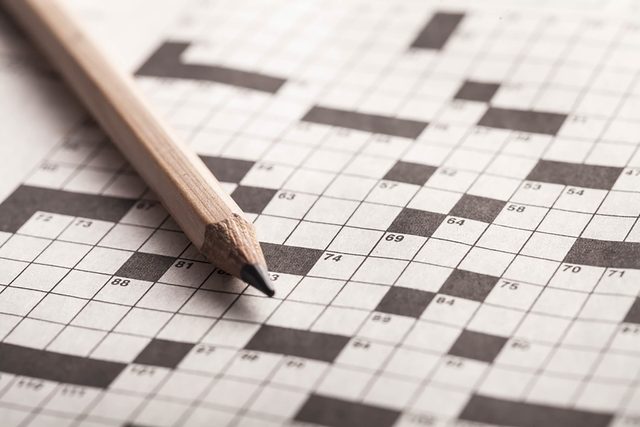The Science Is In: Crossword Puzzles Can Literally Make Your Brain Younger
Updated: Jun. 23, 2022
Grab a pencil—or a pen if you're bold—and get ready to turn back time in your brain.

Your daily crossword puzzle is doing a lot more for you than helping you killing time on your work commute. It’s actually making you smarter into your golden years. Here are more ways to make the most of your commute.
A large-scale online trial carried out by experts at the University of Exeter Medical School and Kings College London found that people who engaged with word puzzles such as crosswords regularly had better brain function later in life. The findings were presented at the Alzheimer’s Association International Conference (AAIC) 2017 in London.
For this study, which is one of the largest of its kind, researchers used tests from the CogTrackTM and PROTECT online cognitive test systems to assess core aspects of the brain function of more than 17,000 healthy people aged 50 and over. They found that participants who engaged with word puzzles most often fared better on attention, reasoning, and memory tests than their counterparts who didn’t complete similar brain teasers.
The researchers discovered that word-puzzle fans have brain function equivalent to 10 years younger than their age on tests of grammatical reasoning, speed, and short-term memory accuracy.
“We found direct relationships between the frequency of word puzzle use and the speed and accuracy of performance on nine cognitive tasks assessing a range of aspects of function including attention, reasoning, and memory,” says Keith Wesnes, Professor of Cognitive Neuroscience at the University of Exeter Medical School, as reported in ScienceDaily. “Performance was consistently better in those who reported engaging in puzzles, and generally improved incrementally with the frequency of puzzle use. For example, on test measures of grammatical reasoning speed and short-term memory accuracy, performing word puzzles was associated with an age-related reduction of around 10 years. We now need to follow up this very exciting association in a clinical trial, to establish whether engaging in puzzles results in improvement in brain function.” To keep children’s brains sharp from the get-go, have them try out these tricky riddles for kids.
It’s well established that keeping an active mind can help to reduce decline in thinking skills as we age. “This new research does reveal a link between word puzzles, like crosswords, and memory and thinking skills,” adds Dr. Doug Brown, Director of Research of Alzheimer’s Society, “but we can’t say definitively that regular ‘puzzling’ improves these skills. To be able to say for sure, the crucial next step is to test if there are benefits in people who take up word puzzles.” In the meantime, he notes, you can reduce the risk of developing dementia by keeping physically active, avoiding smoking and eating a healthy balanced diet.
Find out what else you can do to live longer and better.